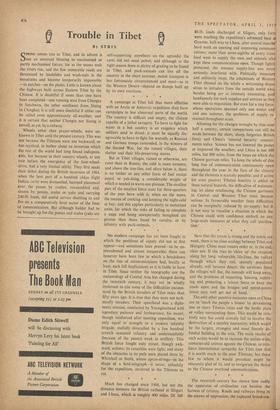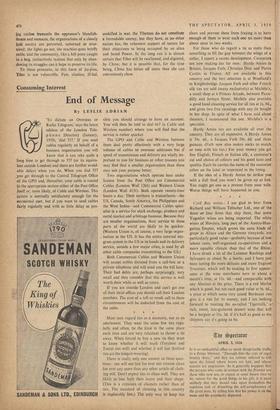Trouble in Tibet
By STRIX SPR ING comes late to Tibet, and its advent is not an unmixed blessing to mechanised or partly mechanised forces; for as the snows melt the rivers rise, and the few motorable roads are threatened by landslides and wash-outs in the mountains and become temporarily impassable —in patches—on the plains. Little is known about the highways built across Eastern Tibet by the Chinese. It is doubtful if more than two have been completed—one running west from Chengtu in Szechwan, the other southwest from Sining in Chinghai; it is still more doubtful if either can be called even approximately all-weather; and it is certain that neither Chengtu nor Sining is served, as yet, by a railway.
Wheels, other than prayer-wheels, were un- known in Tibet until the present century. This was not because the Tibetans were too backward, or too mystical, to bother about an invention which the rest of the world had long found indispens- able, but because in their country wheels, at any rate before the emergence of the four-wheel- drive, had a very limited utility. They first made their debut during the British incursion of 1904, when the best part of a hundred ekkas (light Indian carts) were dismantled, humped piecemeal over the passes by coolies, reassembled and, drawn by ponies, mules or yaks and carrying 240-1b. loads, did useful service shuttling to and fro on a comparatively level sector of the lines of communication. But although fodder had to be brought up for-the ponies and mules (yaks are self-supporting anywhere on the uplands) the carts did not need petrol; and although at the right season there is plenty of grazing to be found in Tibet, and pack-animals can live off the country in the short summer, motor transport is less fortunately circumstanced and must—as in the Western Desert—depend on dumps built up by its own exertions.
* • * A campaign in Tibet has thus more affinities with an Arctic or Antarctic expedition thab have campaigns in less abnormal parts of the world.
The country is difficult and empty, the climate capable of a lethal savagery. To have to fight for water in a hot country is an exigency which soldiers used to dread; it must be equally dis- agreeable to have to fight for warmth, as Russian and German troops contended, in the winters of the Second War, for the ruined villages, their shelter and their life-preserving stoves.
But in Tibet villages, ruined or otherwise, are rarer than in Russia; the cold is more extreme; and above the tree-line, and often below it, there is no timber or any other form of fuel except angol, or yak-dung, a considerable weight of which is needed to warm one platoon. The smallest part of the smallest force must for three-quarters of the year have with it, when on the move, the means of cooking and keeping the night-cold at bay; and this applies particularly to motorised units, for which the risks of failing to complete a stage and being unexpectedly benighted are greater than those faced by cavalry, or by infantry with pack-animals.
No modern campaign has yet been fought in which the problems of supply did not at first appear—and sometimes later proved—to be un- precedented and almost insuperable; there can however have been few in which a breakdown on the line of communications had, locally at least, such fell implications as it is liable to have in Tibet. Since neither the topography nor the meteorology of Central Asia has changed during the twentieth century, it may not be wholly irrelevant to cite some of the difficulties encoun- tered by the British invaders of Tibet more than fifty years ago. It is true that they were not tech- nically invaders. Their spearhead was a diplo- matic mission, conducted by Younghusband with legendary patience and forbearance; his escort, though reinforced after meeting opposition, was only equal in strength to a modern infantry brigade, usefully dN,ersified by a few hundred scratch mounted infantry and understandably (because of the passes) weak in artillery. This British force fought only minor, though awk- ward, actions; its casualties were light; and many of the obstacles in its path were placed there by Whitehall or Simla, whose apron-strings—in the shape of a field-telegraph—it never, unluckily for the expedition, occurred to the Tibetans to cut.
Much has changed since 1904, but not the distance between the British railhead at Siliguri and Lhasa, which is roughly 400 miles. Of 360 80-lb. loads discharged at Siliguri, only forty were reaching the expedition's advanced base at Gyantse, half-way to Lhasa, after several months' hard work on opening and improving communi- cations; more than seven-eighths of every train- load went to supply the men and animals who kept these communications open. Though lightly protected, the tenuous supply-line was never seriously interfered with. Politically immature and militarily inept, the inhabitants of Western Tibet showed on the whole a welcoming dispo- sition to intruders from the outside world who, besides being per se intensely interesting, paid handsomely for such supplies and services as they were able to requisition. But even for a tiny force, whose operations spanned only one winter and and one summer, the problems of supply re- mained throughout acute.
Allowing for the changes wrought by time over half a century, certain comparisons can still be made, between the short, sharp, forgotten British foray and China's 'internal 'security' commit- ments today. Science has not lowered the passes or improved the weather; and Lhasa is not 400 miles, but 800 miles, from the bases on which the Chinese garrison relies. To keep the whole of this long line of communication continuously open throughout the year in the face of the climate and the elements is scarcely possible; and if active (or even passive) Tibetan hostility is added to these natural hazards, the difficulties of maintain- ing, let alone reinforcing, the Chinese garrisons in Central and Western Tibet must become serious. In favourable weather these difficulties can be marginally reduced by air-supply; but it is not easy to visualise a situation in which the Chinese could with confidence embark on any large-scale measures of what they call 'pacifica- tion.'
* * *
Save that the tyrant is strong and the rebels are weak, there is no close analogy between Tibet and Hungary. China must restore order or, in the end, clear out. If she tries to 'clean up' the situation along her long, vulnerable life-lines, the valleys through which they run, sparsely populated already, will become desert; the survivors from the villages' will flee, the nomads will keep away, and the problems of importing, housing, supply- ing and protecting a labour force to keep the roads open and the bridges and petrol-points intact may well get out of hand.
The only other punitive measures open to China are to 'teach the people a lesson' by devastating, one or more Tibetan cities and the fertile plain or valley surrounding them. This would be rela- tively easy but could scarcely fail to involve the destruction of a notable monastery, which would be the largest, strongest and most fiercely de- fended building in the area. The main results, of such action would be to increase the nation-wide, centuries-old animus against the Chinese, to rein- force international sympathy for Tibet (not that it is worth much to the poor Tibetans; but those few to whom it would percolate might be obscurely glad of it), and to invigorate the threat to the Chinese overland communications.
* * *
The twentieth century has shown how easily the apparatus of civilisation can become the harness of tyranny. Roads and railways bring in the sinews of oppression, the captured broadcast- Ong station transmits the oppressor's blandish- ments and menaces, the organisations of a closely knit society are perverted, suborned or over- awed; the lights go out, the machine-guns briefly rattle, and the community, like a hill-pony caught in a bog, instinctively realises that only by aban- doning its struggles can it hope to preserve its life.
To these pressures, to this form of jiu-jitsu, Tibet is not vulnerable. Few, clueless, ill-led, unskilled in war, the Tibetans do not constitute a formidable enemy; but they have, as no Other nation has, the vehement support of nature for their objections to being occupied by an alien and hated Power. In the long run it is almost certain that Tibet will be swallowed, and digested, by China; but it is possible that, for the time being, China has bitten off more than she can conveniently chew.



































 Previous page
Previous page